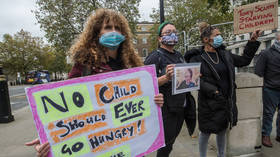Denying kids meals will be BoJo’s legacy, but the solution for feeding the poor is community based – and that means proper funding

Boris Johnson’s government has refused to extend a free school meal scheme to England’s half-term holiday. It’s time local communities took charge of providing meals for school kids, but they need to be adequately funded.
I’m sure Britain’s government had hoped that the ongoing debate about free meals for children, following a high-profile campaign by footballer Marcus Rashford, would have burned itself out by now.
Minister after minister and MP after MP have ventured out in front of the national media and attempted to defend what really is indefensible, which amounts to the poorest children in England being denied meals in their half-term holiday after the government ruled out extending free meals beyond term time. But still Prime Minister Boris Johnson refuses to budge.
The Conservative party walked into a very obvious trap from Labour, who tabled a vote on the matter knowing that the Tories would reject the idea, effectively sending a message out to the country that they still are the nasty party.
As former Conservative PM Margaret Thatcher discovered, direct attacks on youngsters don’t go down well. As education secretary in the Seventies, she denied daily nutrition to youngsters in the form of a small bottle of milk for 7 to 11-year-olds in primary and junior schools, and was forever known as cruel, with ‘Maggie Thatcher, milk snatcher’ sung in playgrounds across the country. It was a decision she later admitted she regretted. The removal of a small bottle of milk painted the Iron Lady as uncaring among the media and in public opinion.
Despite government rhetoric since the beginning of the welfare state in 1945, food poverty, housing poverty and child poverty have never gone away, and opposition voices in parliament are making a lot of noise about this latest Tory media disaster. Perhaps they have learned a lesson from their abstention in the 2015 welfare reform bill that saw £12 billion in cuts falling on the poorest families’ shoulders. At the time, the Labour party was being led temporarily by Harriet Harman and instead of voting down the bill, all but 48 of its MPs abstained.
Attacking the poorest in society, or at best ignoring them, is easy for politicians. After all, the poorest have no power to fight back. So, if politicians say we need to cut benefits for those who don’t work, or we need to cut social care for children whose parents are feckless, or with rights come responsibilities – meaning if you want to eat, you must adhere to whatever condition is laid down – these ideas are usually easy to sell to a population, especially in times of economic distress when everyone is looking after their own purse.
Political narratives of all hues have used the ‘tough on the feckless’ rhetoric, as it is an easy win. The poorest have no voice at all and the rest of society, who are mostly ignorant to the draconian and soul-destroying welfare system, think it’s fair to look after those who appear to be working hard and doing ‘the right thing’, whatever that may mean at any particular time.
However, what history teaches us is that politics is fickle and politicians, for the most part, are at best diplomatic with their moral standpoint and at worst wholly self or party politically interested. This means that the poorest, most vulnerable, people are forever putting their faith in a political system that is willing to throw them under the bus as the gaining or losing of political capital dictates. No wonder that in the poorest neighbourhoods, voter turnout is increasingly dwindling as communities realise that political parties use them as leverage one way or another.
Also on rt.com As Boris Johnson announces Britain’s ‘great reset’, were the Covid ‘conspiracy theorists’ right all along?So, what is to be done? Labour’s deputy leader Angela Rayner caused a stir when she called Tory MP Chris Clarkson “scum” during a debate in Parliament, leading to #Toryscum trending on social media in recent days. But in reality, there needs to be a serious discussion about poverty in the UK – the world’s sixth richest nation – and we cannot leave it up to the politicians. It’s too important for party politics.
The Tories have doubled down on their position, despite the prevailing mood from the public that they have got it wrong and the opposition using the opportunity to give them a good kicking. Meanwhile, communities and small businesses have stepped in, offering food for children on free school meals up and down the country.
This ensures this story will not die, as it becomes very local and of community interest as cafés, pubs and charities, already struggling because of various Covid-19 measures, are trying to meet the need in feeding hungry children. I’m not going to criticise this approach – after all, it is well intentioned. And I’m definitely not going to argue, as many of the government’s opponents are, that it is not the place of the community to feed children, but the responsibility of those in power.
Instead, I offer a different argument. It is absolutely communities’ responsibility to look after each other, because on a local level they know their communities better than any centralised government. But it is the government’s responsibility to ensure that central funding is redistributed fairly into every community.
I believe that meals for all children at school should be free and provided every day through local community groups, schools and youth clubs. This would build solidarity among communities and strengthen local social capital, while the universalist approach would mean all children could be included, despite their family background. That way, the poorest children would no longer be used as a political football or held hostage to any political ideology. Nor would they and their families be stigmatised by being hungry.
Our aim as a nation should surely be that no one should be reliant on charity to survive. But all of us must realise our interconnectedness, and that only solidarity can deliver a healthy society.
Think your friends would be interested? Share this story!
The statements, views and opinions expressed in this column are solely those of the author and do not necessarily represent those of RT.















